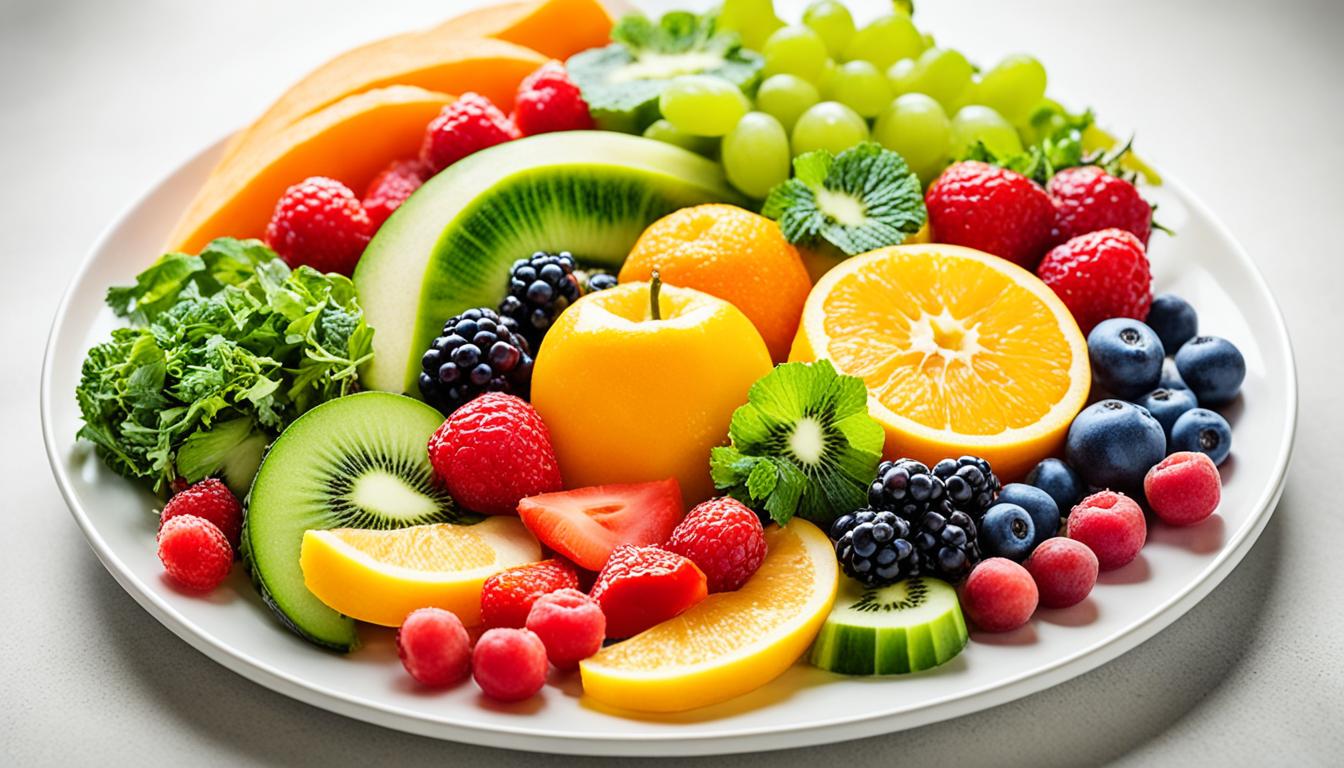According to the American Cancer Society, around 1.9 million people may get cancer in the U.S. in 2022. Genetics play a role but studies suggest that almost 25% of cancer cases could have been avoided with the right diet. Cancer develops over time, so what you eat each day is super important for cancer prevention. In this article, we’ll talk about natural ways to prevent cancer. We’ll look at how eating plant foods, using herbs, and changing your lifestyle can help in a holistic approach.
Key Takeaways
- An estimated 1.9 million cancer cases will be diagnosed in the U.S. in 2022.
- Nearly 25% of cancer cases could be prevented with diet and nutrition alone.
- Plant-based diets are linked to the lowest rates of cancer compared to other diets.
- Fiber-rich diets can reduce the risk of breast and colorectal cancer.
- Integrating traditional and modern medicine can provide a synergistic approach to cancer prevention and treatment.
The Power of Plant-Based Foods in Cancer Prevention
Plant-based foods are packed with phytochemicals. These are natural compounds that shield the body. They also fight off processes that can lead to cancer. Phytochemicals do a lot of good. They cut down inflammation and guard cells from harm.
Two standout phytochemicals are antioxidants and carotenoids. Antioxidants stop harmful oxidants in their tracks. Carotenoids are another group of helpful compounds. They’re found in lots of plants and fruits.
Phytochemicals: Nature’s Cancer-Fighting Compounds
Plant-based cancer remedies rely on phytochemicals. Cancer-fighting foods are packed with these compounds. They’re key in stopping cancer from starting. Think of them as nature’s shield against this disease.
Antioxidants: Protecting Cells from Damage
In the fight against cancer, antioxidants are crucial. They keep cell-damaging free radicals at bay. This protection keeps cells healthy. It’s a big help in avoiding cancer and staying well.
Carotenoids: Fat-Soluble Cancer Fighters
Carotenoids, like beta-carotene and lycopene, are important. They lessen heart disease and eye problems. These plant-based cancer remedies are in lots of fruits and veggies. They’re a cornerstone of cancer-fighting diets.
The nutrients in plant-based foods lower the risk of cancer and other diseases. This shows the strength of choosing a plant-based cancer prevention path.
The Role of Fiber in Reducing Cancer Risk
Diets rich in plants and fiber can significantly lower the risk of certain cancers, like those in the breast and colon. These foods help control insulin levels and keep our digestion healthy. They are essential in the fight against cancer.
Fiber and Breast Cancer Prevention
In a notable study, young women eating high-fiber diets showed a 25% lower risk of breast cancer later. This finding stresses the value of plant-based cancer remedies and fiber in cancer prevention. It’s especially key for those more prone to such cancers.
Fiber and Colorectal Cancer Prevention
Research also points to fiber’s role in reducing colorectal cancer risk. Add 10 grams of fiber daily and your risk drops by 10%. Fiber feeds good gut bacteria, creating helpful compounds.
These compounds aid colon health, lower inflammation, and boost the body’s cancer defenses. So, fiber in cancer prevention is a potent force in our health.
Eating for Color and Variety: A Plant-Based Guide
A plant-based diet is filled with delicious and healthy foods. It’s important to eat enough fruits and vegetables each day. Try to include 1.5 to 2.5 cups of fruits and 2.5 to 4 cups of vegetables in your meals daily. Also, don’t forget to add whole grains and legumes like oats, quinoa, and brown rice to your plate. These foods are key for preventing cancer.
Fruits and Vegetables: Recommended Daily Intake
To help keep cancer at bay, eating a mix of fruits and vegetables every day is wise. Try out different fruits and veggies, and new ways of cooking them. This will keep your plant-based diet fun and doable.
Whole Grains and Legumes: Essential Components
Whole grains and legumes are vital in a plant-based diet for cancer prevention. These foods bring plenty of fiber, protein, and good carbs to your meals. Make sure they’re a regular part of what you eat.
Healthy Fats: Plant-Based Sources
Include plant-based sources of healthy fats too, like avocados, nuts, and oils from plants. These healthy fats keep you full and are important for staying healthy and cancer-free.
Transitioning to a Plant-Based Diet for Cancer Prevention
Shifting to a plant-based diet for cancer prevention doesn’t need to happen all at once. It’s more effective to make changes step by step. By starting your mornings with a healthy plant-based breakfast, like whole-grain oatmeal or fruit-topped buckwheat, you lay the foundation for healthier eating. Gradually cut back on eating meat by joining “meatless Mondays” and experimenting with meatless meal recipes every week.
Start Your Day with a Nutritious Breakfast
For a strong start, choose a plant-based breakfast that’s rich in fiber and nutrients. Eating whole grains like oatmeal, quinoa, or buckwheat is not only satisfying but healthy. Add some fresh fruit to your breakfast to get a dose of antioxidants and phytochemicals that may reduce cancer risk.
Embrace Meatless Meals and Reduce Meat Consumption
Work towards having meatless meals gradually. Begin with a “meatless Monday” then add a new plant-based meal to your menu each week. Over time, this approach helps you cut down on meat and enriches your diet with fruits, veggies, and grains. Doing this makes the journey towards a more plant-based diet for health much easier. It turns the process into a lifestyle you can maintain long-term.
Use Legumes as a Protein Source
Beans, lentils, and tofu are key plant-based protein sources. By including these in your meals, you lessen meat dependence. Plus, you boost your fiber, vitamin, and mineral intake, which are all good for countering cancer risks.
Traditional Medicine and Modern Medicine: A Synergistic Approach
Research has shown that using self-healing methods, like traditional medicine and cancer prevention, can make us healthier. It can also help fight cancer. Natural products in cancer drug discovery are key in finding new ways to beat cancer.
Natural Products in Drug Discovery
The use of natural products in cancer drug discovery is very valuable. A study by Newman et al. (2003) proved this. They found that natural products greatly help in making new medicines. As integrative oncology grows, the search for natural ways to prevent and treat cancer is vital.
Integrating Traditional and Modern Medicine
Combining traditional medicine and cancer prevention with modern cancer treatments is powerful. It combines natural and traditional healings with advanced medicine. This integrated approach helps patients fight cancer better. It can also improve their life quality.
prevention of cancer through nature
The foods you choose at the store impact more than meals. Choosing foods like fruits, vegetables, and legumes grows best in the ground. These foods could be the best way to prevent cancer. Plant-based diets are known to lower cancer rates. Fruits, veggies, and legumes have antioxidants that protect our bodies. This helps to reduce the risk of cancer.
Natural Compounds Targeting Cancer-Specific Pathways
Some natural compounds target specific ways cancer grows and spreads. For instance, honokiol boosts TRAIL’s power to kill cancer cells through programmed death. Another compound, acridine chalcone, triggers a type of stress in cancer cells that can cause their death. There are many natural compounds for cancer prevention that offer hope. They might work alone or with traditional treatments.
Honokiol and TRAIL-Mediated Apoptosis
The compound honokiol helps TRAIL signal cancer cells to self-destruct. TRAIL targets only cancer cells for death. Honokiol makes these cells more sensitive to TRAIL. It’s a key player in using nature to fight cancer.
Acridine Chalcone and Oxidative Stress
Acridine chalcone creates oxidative stress in cancer cells, leading to their demise. Oxidative stress arises from an imbalance that acridine chalcone exploits. This imbalance triggers the cancer cells’ destruction. Thus, acridine chalcone is a potent natural compound for fighting cancer.
These and other natural compounds open new doors in cancer care. They show big promise in stopping cancer’s growth and spread. They can be used on their own or with traditional cancer treatments. By focusing on cancer’s specific points, natural compounds for cancer prevention act as added tools against the disease.
The Role of Plant-Based Diets in Cancer Prevention and Treatment
Plant-based diets are key in stopping and fighting cancer. They are full of phytochemicals which stop new blood vessels growing to feed tumors. This way, they help stop cancer cells from spreading.
Anti-Angiogenic Effects of Phytochemicals
Studies show many plant chemicals can stop new blood vessels from forming. This cuts off the tumor’s food and oxygen supply, limiting its growth. So, eating lots of plants can help battle cancer.
Metformin: A Potential Anti-Cancer Agent
Metformin, a drug for diabetes, is also seen as good against cancer. It has shown benefits in breast cancer by attacking cancer stem cells and by making chemo more efficient. Combining plant diets with metformin offers a broad way to fight cancer, using both natural and drug treatments.
FAQ
What are the key benefits of plant-based foods in cancer prevention?
How can a plant-based diet help prevent breast and colorectal cancer?
What are the recommended daily intake of fruits, vegetables, and other plant-based foods for cancer prevention?
How can I gradually transition to a more plant-based diet for cancer prevention?
How can the integration of traditional and modern medicine benefit cancer prevention and treatment?
What are some natural compounds that have shown promise in targeting cancer-specific pathways?
How can plant-based diets and natural compounds like metformin be integrated into a comprehensive cancer prevention and treatment strategy?
Source Links
- https://www.ncbi.nlm.nih.gov/pmc/articles/PMC8615517/
- https://www.mayoclinichealthsystem.org/hometown-health/speaking-of-health/plant-power-to-lower-cancer-risk
- https://www.ncbi.nlm.nih.gov/pmc/articles/PMC7400843/
- https://www.ncbi.nlm.nih.gov/pmc/articles/PMC526387/
- https://www.ncbi.nlm.nih.gov/pmc/articles/PMC10255454/
- https://www.cancer.org/cancer/survivorship/coping/nutrition/once-treatment-starts.html
- https://www.ncbi.nlm.nih.gov/pmc/articles/PMC7770496/
- https://www.ncbi.nlm.nih.gov/pmc/articles/PMC8210981/
- https://www.nature.com/articles/s41538-023-00239-6
- https://www.ncbi.nlm.nih.gov/pmc/articles/PMC6273146/
- https://www.ncbi.nlm.nih.gov/pmc/articles/PMC9971193/
- https://www.mdpi.com/1424-8247/17/5/598
- https://www.nature.com/articles/nrc3397
- https://www.nature.com/articles/s41698-018-0075-9
- https://www.ncbi.nlm.nih.gov/pmc/articles/PMC4017674/
- https://www.ncbi.nlm.nih.gov/pmc/articles/PMC8945097/
- https://www.nature.com/articles/s41573-021-00339-6
- https://www.oaepublish.com/articles/2572-8180.2018.05
- https://www.ncbi.nlm.nih.gov/pmc/articles/PMC9750928/



